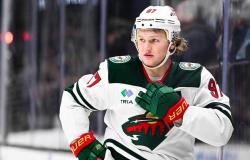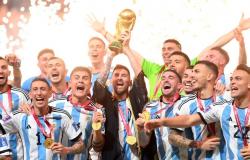Kent Hughes is in hot water, and this time he can’t get out of it with a smile or a lawyer’s evasive response,
Since Mathias Brunet revealed the details of what the Blue Jackets were asking for David Jiricek, the patience of Canadian fans is crumbling even more.
An affordable offer, almost derisory in the eyes of many, was enough for the Minnesota Wild to get their hands on one of the most promising defenders of his generation.
Meanwhile, Hughes, true to form, preferred to save his “stingers” for an uncertain future. A decision which, in retrospect, borders on insulting the supporters of a team which continues to accumulate defeats.
According to Brunet, the Wild did not have to empty their coffers to acquire Jiricek, the sixth overall pick in the 2022 draft.
A 2025 first-round pick that could go as high as 32nd, a third-round prospect (Daemon Hunt), and a few draft picks spread out over the next few years were enough.
What is striking is how this transaction seems within the Canadian’s reach.
The Canadian was in the running for David Jiricek, but Hughes refused to give in to the demands of Wild GM Bill Guérin.
According to Brunet, a similar offer would have involved the Canadiens’ 2025 second-round pick (currently 34th overall), Oliver Kapanen or Luke Tuch, a second-round pick, a third-round pick and a fourth-round pick. No first-round picks, no top prospects.
But no. Hughes preferred to wait, hold on to his low-level prospects, keep his draft picks that he doesn’t need because he has them, and hope for a miracle in the distant future.
This refusal to move, this chronic inability to sniff out good deals, is beginning to define his mandate in Montreal.
This isn’t the first time Hughes has missed a golden opportunity. Fans still remember the trade of Artturi Lehkonen, sent to Colorado for Justin Barron and a second-round pick.
Lehkonen has since become a key player for the Avalanche, while Barron struggles to establish himself in an already fragile defense.
This transaction, already described as a major blunder, comes back to haunt Hughes every time a hope disappoints or an opportunity is missed.
With Jiricek, Hughes had a chance to restore his image. But instead, he chose the path of caution, a caution that is beginning to feel like paralysis.
Hughes also missed his shot with Tyler Toffoli. The latter had one of the best contracts in the NHL, he was still signed for two more years at $4.25 million per year, we were talking about one of the best scorers in the NHL, there was no urgency to compromise it.
But Hughes, eager to make his first trade, sent Toffoli to the Calgary Flames for Emil Heineman and a late first-round pick (Filip Mesar).
Another example that Hughes (with supervision from Jeff Gorton) is always pushing the wrong buttons. Sometimes in a hurry to make a transaction where he gets screwed, sometimes afraid to get on the bandwagon when a transaction is worth it, Hughes has no sense of the “deal”.
Needless to say, he didn’t want to trade Josh Anderson when his value was high and he didn’t want to trade Mike Matheson last summer when he could get the moon.
We know the rest. Their value has collapsed.
Defenders of Hughes often point out that reconstruction is a long-term process. That Nick Suzuki, Cole Caufield, Juraj Slafkovsky, and Lane Hutson will form the core of a competitive team in a few years.
Ivan Demidov and Michael Hage will arrive, without forgetting David Reinbacher, hoping that the fragile defender does not become the biggest draft mistake in CH history. Ignoring a generational prodigy like Matvei Michkov will follow him forever.
The top 3 pick coming up in the next draft will help Kent Hughes get back on his feet.
But how long are supporters expected to wait? Each season in the bottom of the ranking takes the team a little further away from its past glory and exhausts the patience of fans.
David Jiricek, despite some challenges adapting to the NHL, represented an immediate solution to one of the Canadiens’ biggest needs: a top right-handed defenseman.
At 21 years old, he still has plenty of time to develop his full potential, and he could have fit perfectly into a young and growing group.
By refusing to move, Hughes not only missed a golden opportunity, but he also sent a worrying message: the Canadian is not ready to take the next step.
Since this revelation, anger has been brewing. Social media is overflowing with scathing comments towards the general manager.
Journalists, pundits and even former players question his long-term vision.
It’s a lack of courage.
He’s too obsessed with his draft picks, as if every player selected after 25th overall is going to be a superstar.
A statistic shared by Brunet clearly illustrates this absurdity: after 25th place, the chances of drafting a star drop to 15%. Why, then, cling so much to these choices?
The train that passes, again and again. And Hughes who refuses to board.
For Kent Hughes, it’s not just a missed opportunity. It’s another chapter in a story where the Canadian always seems to be late.
Hughes, although hired for his creativity and flair, showed himself incapable of acting in decisive moments.
The Wild’s trade of Jiricek is a public humiliation, striking proof that other teams know how to build a competitive future, while the CH still skates in uncertainty.
Hughes, true to his conservative approach, chose to hold on to his assets, believing that the “red flags” around Jiricek warranted this caution.
And the red flags around Barron didn’t scare him? In the end, dear Justin isn’t even a regular NHL defenseman.
Players like David Jiricek only become available on rare occasions. By letting him slip away, Hughes sends a worrying message: the Canadian is not ready to come out of the reconstruction.
If Hughes does not quickly correct the situation, he risks becoming the symbol of an era of stagnation for the Canadian.
An era where victories are rare, hopes disappointed, and trains always missed.





